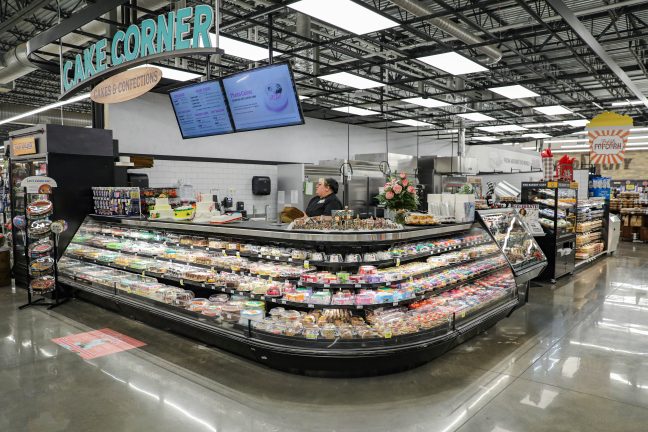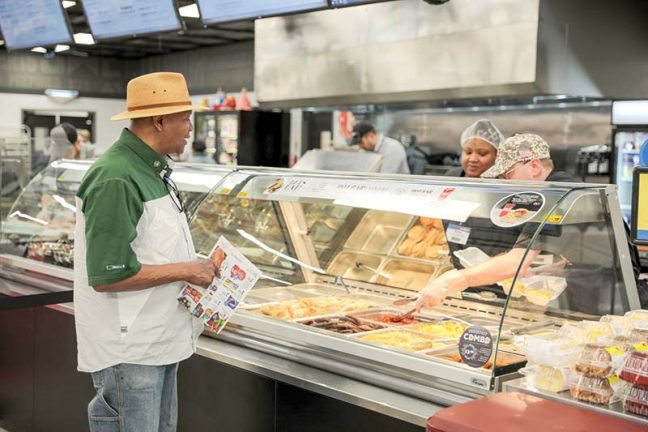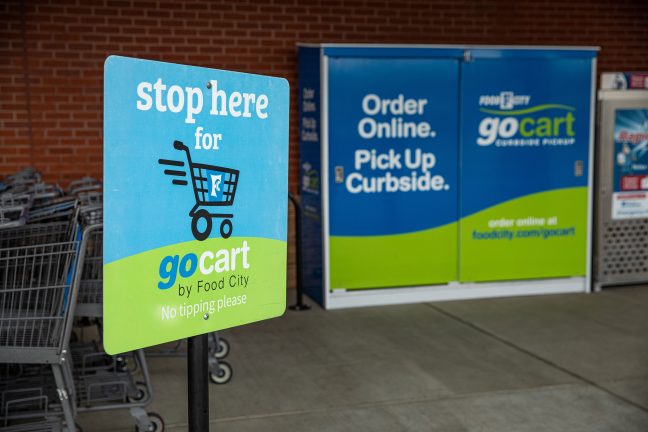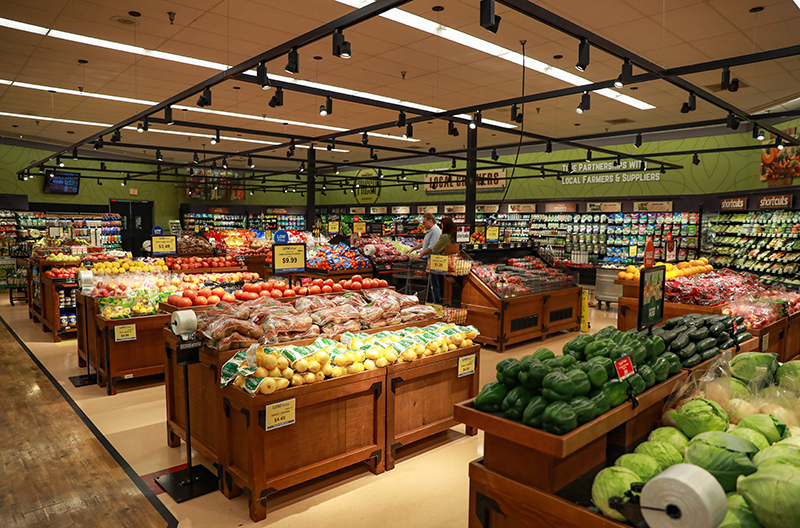Food City, The Shelby Report of the Southeast’s Retailer of the Year, was founded on the simple notion to run the best store in town. But how has it accomplished that?
Customer experience is the strategy, said Dan Glei, EVP merchandising/marketing.
“If you come into our stores as a customer, we want you to have an experience that’s going to be really highly positive and makes you want to come back. We want you to tell your friends about it. We want you to say, ‘My Food City down the street.’”
Community involvement, local offerings, high-quality products with affordable prices, prepared foods, third-party partnerships and improved stores are the company’s way of making each store special.
“When people begin to identify with that personalization of their stores, that’s when you know you kind of arrived in terms of experience,” Glei said. “Now that experience can be different things for different people, which is great. In the markets we do business, we serve a diverse group of customers. You’ve got all walks of life coming to your store. You want that experience to be felt by all walks of life.”
Customers should feel at home when they come into the store. Associates are encouraged to greet everyone and provide them with the best experience possible. That comes from the culture, according to John Jones, EVP/director of store operations.
“If a customer asks, ‘Where are the Rotel Tomatoes?’ We want our associates to take you right back to the tomatoes to show you where they’re at,” Jones said. “We encourage everyone to speak to everyone every day. If a customer walks in and they pass a teammate, we expect them to acknowledge you and to speak to you. We’re not only creating a place for them to shop, we’re hopefully creating an experience that when they go home, they’re telling their friends.”
This experience extends to every department. In the meat department, customers can get their steaks hand cut. Prior to COVID-19, customers were encouraged to sample fruit. And even on rainy days, courtesy clerks help customers to their cars under an umbrella.

“People don’t forget things like that,” Jones continued.
Getting involved with the community is one of Food City’s largest core qualities. Store managers are encouraged to join local civic clubs. Stores are provided funding to return to the community. And associates are rewarded for their efforts outside work. It gives them a sense of belonging, raises brand awareness and reminds customers that those bagging their groceries or stocking their produce are their neighbors.
“Customers like to identify with people that are like them or are interested in the same things they are. You can see your local produce manager at a Little League baseball game. It could be Junior League or it could be Tennessee football. Associates want to be involved with their community. Because it’s theirs,” Glei said.
The grocer works closely with local vendors and entrepreneurs, most notably farmers. In the produce department, customers can read about the farms that grew the fruits and vegetables. Likewise, brands made locally can be found throughout the store. As beverage alcohol continues to grow in store space, providing local craft beers and wines has been key.
“People really value that, and it sets us apart from the national chains that come in. It’s really hard for them to do this. And I’m not sure they have the same level or mission statement to deliver upon that,” Glei said. “We want Food City and every place we do business, whether we’re in Abingdon, [Virginia] or Albertville, Alabama, we want you as a customer to believe we’re deeply connected to the community. That’s important to us.”
Starbucks and sushi deserts
The company also partners with nationally recognized brands to enhance the customer experience. This spring, the company celebrated the opening of its 50th Starbucks location. The partnership with the coffee shop, which began in 2017, has delighted customers who rarely see the brand.
“When we brought Starbucks to some of our stores, there was not another Starbucks for almost 100 miles. That may be hard to imagine, but if you’re in Pike County, Kentucky, your closest Starbucks was someplace in West Virginia,” Glei explained.
When the partnership was established, Glei said the company told Starbucks it would take the brand “to places it needs to be and to customers who want it.” He referred to these areas as “Starbucks deserts.”
Food City’s foodservice and meat department brings fresh, made-in-house sushi offerings to areas that might not otherwise have any.
“We’re an enabler for those services and those opportunities and options to come to some of our communities. That’s certainly not the case everywhere. But in many places, it is. Customers still appreciate the experience,” Glei said.
Food City also has partnerships with e-commerce platforms Instacart and DoorDash for customers to get groceries or prepared foods delivered to their homes.
Foodservice
The company has a long history of preparing fresh food inside its stores. It’s a catalyst for many store remodels, according to President Steve Smith.
“Really that’s the main reason that we’ll expand a store is to give the foodservice department more room,” he said.
The offerings at several newer or remodeled locations include: sushi; gas-fired Asian wok-prepared dishes; The “Q” Smoke Pit Famous Smoked Meats; brick oven baked pizzas; fresh food bar with a variety of soups, salads and fruit selections; olive and wing bar; and daily rotation of freshly prepared foods. They also have a variety of daily, made-from-scratch deli salads, desserts, breads and other bakery items.

The classic “meat and two sides” plate continues to be a staple at Food City as the company offers a hot bar combo that includes a drink for under $10. Staples of the bar include homestyle favorites like meat loaf and fried chicken or fish while also rotating internationally inspired menus such as Italian, Mexican and Asian. The hot bar is open daily for breakfast, lunch and dinner.
Customers also can order specialty cakes, party trays, fresh sandwiches and heat-and-eat items. Some locations offer full-service catering and event planning.
As a testament to the volume of prepared food that some Food City foodservice departments can encounter, Katie Penny recalled the day after COVID-19 non-gathering restrictions were lifted in Hamilton County, Tennessee.
“I was working at one of our highest volume stores in the division,” said Penny, district manager-Chattanooga division. “I remember we had a 96-piece chicken order going out at nine o’clock and the main cook had called out. Myself and the foodservice manager, we just jumped in. We just started frying. And I don’t think we stopped frying until four o’clock that day.”
She received the Golden Clucker Award last year for her division achieving the highest percentage in chicken sales.
“That’s a lot of hard work and execution on all of our foodservice associates’ parts and being consistent on providing a good quality product for our customers and being able to take care of their needs at those peak times,” she said.
Food City also uses its prepared foods for events across its market areas. It has a fleet of 13 mobile smokers that are used at different stores every weekend for outdoor events in the stores’ parking lots, according to Steve Holloway, VP of meat/seafood operations.
Two smokers stay at two of the company’s highest volume stores in Kingsport and Gatlinburg, Tennessee, while the rest are assigned to a district for use at fundraisers and other events.
“These are big mobile smokers that hold a lot of product,” Holloway said. “We can get 100 Boston butts, probably 120, maybe (130) racks of ribs.”
Food City will smoke a variety of meats such as Boston butts, briskets and baby back ribs to be used in a variety of recipes, including sliders, smoked mac n’ cheese or loaded baked potatoes. The mobile smokers continue to grow in popularity.
“It’s big, but the pitmasters have big followings, the ones that have been around a while. We get emails from customers every day wanting to know where they’re going. We have a schedule on our website, but the guys have big followings.”
The weekend events are scheduled to end at 9 p.m. but typically sell out long before then, according to Holloway.
Promotions, sales and deals
The weekly ad is key for retailers. Food City provides its ad for print and online through the Food City app and website. Alongside rotating sales, the company touts special events, advertises deals and provides members of its ValuCard rewards program with extra savings. It also offers bulk savings, BOGOs, weekend deals, Pick 5 deals, over 20 private label brands, online-only promotions and special weekend discounts.
Kevin Stafford, VP of marketing, said these deals help balance Food City as it appeals to different types of consumers. On that note, Glei explained that customers looking for quality or value don’t have to choose one or the other.
“Even though experience is our strategy, it means different things to different people,” he said. “We may know that you’re a quality-driven shopper, but there’s another shopper that comes to our stores. They’re a very price-driven shopper. They have a certain amount of money that they have to be able to feed their families. We work pretty hard to take care of that particular customer.”

When customers walk through the store, they can find items that have been marked with a blue “Value Every Day,” red “SALE!” or a green “LOWER Price” sticker. All three represent value for customers. Likewise, bulk sales are found on items with the “Buy More SAVE MORE” tags.
Customers with a ValuCard membership get access to BOGO sales. They also get access to Food City’s Fuel Bucks program, which provides a discount at the fuel pump. Members get value every day with the Food City Pick 5 program. Customers pick five specially marked meat items to receive a discounted price of $19.99. Similarly, they can pick five marked produce items for $7.99.
GoCart, the retailer’s pickup and e-commerce service, offers special savings such as free items, discounts, bonus Fuel Bucks and more, according to the company’s website. Food City also works with its suppliers to provide the best value for their e-commerce shoppers. Customers can waive their $4.99 pickup fee by meeting brand-specific purchase requirements such as purchasing $20 or more of Coca-Cola products.
“Price competitiveness is absolutely critical to maintain your success,” Glei said. “Because if you’re going to be a quality-driven retailer, your ability to serve our customers is going to be limited. We have the absolute responsibility in our communities to be able to serve all customers.”
Improving stores
Food City has invested millions of dollars to revitalize and update older stores. These updates include more square footage, larger perimeter departments, updated technology and enlarged center store areas, which can include a growler station with craft beers and wines on tap. The remodeled stores also feature rentable community spaces and award-winning energy saving concepts such as refrigeration motion sensors, LED lighting and open rafter ceilings.
To date, the company has improved about 80 percent of its stores, with more scheduled. Steve Smith, president of Food City, explained how the company goes about making some of the changes.
“You have to do it the right way. We update stores in a variety of ways,” he said. “You can replace a store – we do that when the store gets a certain age or maybe it’s landlocked and it can’t be expanded anymore. A lot of times, you can enlarge the store by going to the right or to the left. In fact, over the next 18 months, we’ve got 12 of those to enlarge.
“A lot of those stores are in the 35,000-45,000-square-foot range and we’re going to take them up to 50,000-58,000 square feet. Because we can do a lot of things with our foodservice department. We can do a lot of things with Starbucks. We can do a lot more things with sushi, expanded frozen food, dairy.
“We’ve got pharmacies in most of those stores already, but sometimes we can give more room to pharmacy. It’s been immensely popular. People love seeing what we’re doing. They love to come into the new stores. It shows a commitment to the people of the community and a commitment to the associates working in the stores.”
Fuel is another portion of Food City’s business that continues to grow. Every new store is built with fuel in mind, and it is always considered when improvements are made.

